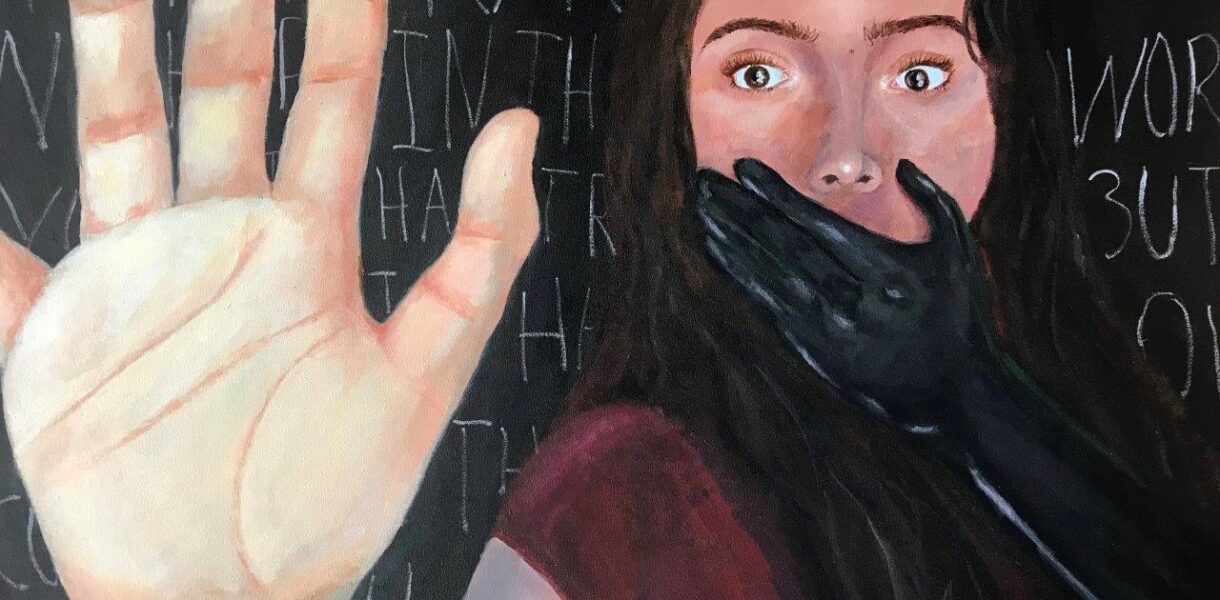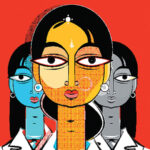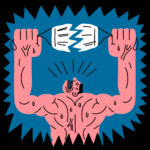

We as citizens of our country that our country is an independent country as we gained independence on 15th august 1947.
But are we really independent? Are we free from the stereotypes, prejudices? Are we free from crime? We feel our country is developing as we see the ratio of girls to boys increasing; more girls being enrolled in schools and many getting higher education. We see women holding important posts like prime minister, president, many joining the armed forces. We get to read about so many important female icons like Nirmala Sitharaman, Sheila Dixit, Kalpana Chawla, Pratibha Patil, and Roshini Nadar.
Are all women able to achieve what they dreamt of? Not only women, the men too face a lot of abuse. The crimes against them are not taken seriously. They too face psychological pressure and cannot tell to others as they feel they will be laughed at. Transgenders were referred to as a third gender in 2014 only.
We live in a society which cannot easily understand the concept of same sex marriage and even after its legalization a few years back, such couples are not given the same level of acceptance which a heterogeneous couple would receive.
Yes, we are progressing. India is growing but at a slow pace. Laws are made but the crimes against gender and sexuality still continue. The evil still prevails in our society. It’s high time we as citizens realize India will be free from such crimes when we at individual level are aware and do not commit or support such crimes.
GENDER
Gender alludes to the attributes of ladies, men, young ladies and young men that are socially developed. This incorporates standards, practices, and jobs related with being a lady, man, young lady or kid, just as associations with one another. As a society develops, gender differs from society to society and can change over the long run.
Gender is layered and creates disparities that converge with other social and monetary imbalances. Gender based separation converges with different variables of segregation, for example, nationality, financial status, inability, age, geographic area, gender personality and sexual direction, among others. This is alluded to as intersectionality.
Gender collaborations is unique in relation to sex, which alludes to the distinctive natural and physiological qualities of females, guys and intersex people, for example, chromosomes, hormones and conceptive organs. Gender character alludes to an individual’s profoundly felt, inner and singular experience of sexual orientation, which might possibly relate to the individual’s physiology or assigned gender upon entering the world.
Gender impacts individuals’ experience of and admittance to medical services. The way that wellbeing administrations are coordinated and given can either restrict or empower an individual’s admittance to medical care data, backing and benefits, and the result of those experiences. Wellbeing administrations should be reasonable, available and worthy to all, and they should be given quality, value, and pride.
Gender disparity and separation looked by ladies and young ladies puts their wellbeing and prosperity in danger. Ladies and young ladies regularly face more noteworthy hindrances than men and young men to getting to wellbeing data and administrations. These hindrances remember limitations for portability; absence of admittance to dynamic force; lower proficiency rates; unfair perspectives of networks and medical services suppliers; and absence of preparing and mindfulness among medical services suppliers and wellbeing frameworks of the particular wellbeing needs and difficulties of ladies and young ladies.
Thus, ladies and young ladies face more serious dangers of unintended pregnancies, explicitly communicated contaminations including HIV, cervical disease, hunger, lower vision, respiratory diseases, lack of healthy sustenance and senior maltreatment, among others. Ladies and young ladies additionally face unsatisfactorily significant levels of viciousness established in sex disparity and are at grave danger of destructive practices, for example, female genital mutilation, and kid, early and constrained marriage. WHO figures show that around 1 of every 3 ladies worldwide have encountered either physical as well as sexual cozy accomplice brutality or non-accomplice sexual viciousness in the course of their life.
Unsafe gender standards – particularly those identified with inflexible thoughts of manliness – can likewise influence young men and men’s wellbeing and prosperity adversely. For instance, explicit ideas of manliness may urge young men and men to smoke, take sexual and other wellbeing chances, abuse liquor and not look for help or medical services. Such gender standards additionally add to young men and men executing brutality – just as being exposed to viciousness themselves. They can likewise have grave ramifications for their emotional wellness.
The soul has no gender then why does law
Crime against men
At the point when we talk about gender fairness we need to zero in on the term ‘uniformity’. It’s about time that since we really need to defend men and their privileges . We can say that there are very little arguments identified with wrongdoing against men. The fact of the matter is there are very little individuals coming up to report the cases which is an unforgiving truth of numerous countries. The Indian public really need to change the idea “men don’t cry”. They do however they don’t appear because of the outlook we have towards men. It would be very unnatural for us if a man comes up and tells that he has confronted some sort of undesired sexual mentality from an individual of his contrary sex.
Several laws have been passed over the most recent 60 years for the sake of insurance of ladies and their strengthening. Notwithstanding, there are no laws to shield men from any type of misuse or badgering inside or outside home. After the sanctioning of the Protection of Children from Sexual Offenses Act 2012 a male youngster younger than 18 years is shielded from any sort of Sexual Offenses. Yet, the incongruity is that when this male youngster will turn 18 years and brief old he will be tossed out of the assurance against any type of sexual offenses. It is on the grounds that abruptly this male youngster has transformed into a ‘Grown-up Man’ who as indicated by our Indian culture needn’t bother with any assurance.
Men are being exposed to extreme separation under law, and their essential basic liberties are being abused each day for the sake of an ever increasing number of legitimate arrangements that case to engage and secure ladies.
A huge number of men are turning out to be casualties of “lawful illegal intimidation” released through laws like Section 498A IPC12, Domestic Violence Act 200513, Adultery laws14, laws against Rape and Sexual Harassment, and even Divorce and Maintenance Laws.
Crime against women
Crime against have been prevalent in our society from a very long time .hundreds of years back Hindus followed the practise SATI in which a widow immolated herself on the funeral pyre of her husband and others like burning of witches were followed .the intensity of these crimes vary from time to time and place to place.
Such crimes occur because of a feeling of superiority or misogyny
Right from birth or even before being born a female could become a victim
|
“Pre-birth |
Sex-selective abortion; effects of battering during pregnancy on birth outcomes |
|
Infancy |
Female infanticide; physical, sexual and psychological abuse |
|
Girlhood |
Child marriage; female genital mutilation; physical, sexual and psychological abuse; incest; child prostitution and pornography |
|
Adolescence and adulthood |
Dating and courtship violence (e.g. acid throwing and date rape); economically coerced sex (e.g. school girls having sex with “sugar daddies” in return for school fees); incest; sexual abuse in the workplace; rape; sexual harassment; forced prostitution and pornography; trafficking in women; partner violence; marital rape; dowry abuse and murders; partner homicide; psychological abuse; abuse of women with disabilities; forced pregnancy |
|
Elderly |
Forced “suicide” or homicide of widows for economic reasons; sexual, physical and psychological abuse”[1] |
Long-term physical and mental health conditions can be caused by violence against women. Not only the women involved, but also their children, families, and communities, are affected by violence and abuse. Such implications include damage to the health of a person, probably long-term harm to children, and harm to communities such as lost jobs and homelessness.
MINORITY WITHIN MINORITIES: VULNERABILITIES OF THE TRANSGENDER
As referenced over, the transsexual network is as of now a minority network everywhere on the world. For youngsters, who are at any rate a weak parcel, showing sex a commonplace conduct can additionally build their vulnerability. Confronted with horde challenges, the weakness of such kids is principally identified with wellbeing — physical and mental, security, brutality upon revelation or information on transsexual status and estrangement from guardians and community .Acceptance of their own way of life as transsexual can be mentally pressurizing given their delicate age and this weight combined with sensations of disgrace, blame and uselessness can prompt more intense mental issues in kids. These sentiments get exacerbated as the youngster grows up frequently prompting wretchedness, helpless confidence and self-destructive thoughts. Children who distinguish themselves as transgender certify their sex by social progressing, which typically remembers changes for sexual orientation signifiers. This cycle, albeit completely reversible actually can be harming, attributable to passionate feelings of disdain on one hand and social disgrace on the other. Transgender Youth with Dignity and Respect (July 2019) For example, making a transsexual youth use restrooms comparing their sex upon entering the world subjects them to the sensations of seclusion, provocation and assault. The chance of confronting dismissal from peers, school, network and even family is in every case extremely high. Parochial mentalities that win in the public arena as a rule convert into renunciation of each person as equivalent. Separation at school and home, minimization in training and medical services, surrender by family and network, harassing, terrorizing and sexual brutality generally stem structure an explicit negligence for the privileges of such children. Therefore, it is basic for us to know about the privileges of transsexual youngsters to all the more likely shield them from separation and misuse
In India, their weakness can be construed from the quantity of transsexual youngsters discovered missing in the year 2019 around 40% of the transsexual populace are confronted with sexual maltreatment from a youthful age. This maltreatment proceeds in any event, when they are adults. Transgender Women “The impact of such maltreatment on a transsexual kid, inferable from their unconventional battles, must be more and for no situation not exactly some other youngster.
Sexuality
“Sexuality is a central aspect of being human throughout life encompasses sex, gender identities and roles, sexual orientation, eroticism, pleasure, intimacy and reproduction. Sexuality is experienced and expressed in thoughts, fantasies, desires, beliefs, attitudes, values, behaviours, practices, roles and relationships. While sexuality can include all of these dimensions, not all of them are always experienced or expressed. Sexuality is influenced by the interaction of biological, psychological, social, economic, political, cultural, legal, historical, religious and spiritual factors.”[2]
Profoundly installed homophobic and trans phobic mentalities, regularly joined with an absence of satisfactory lawful security against segregation on grounds of sexual direction and sex personality, uncover numerous lesbian, gay, swinger and transsexual (LGBT) individuals, everything being equal, and in all areas of the world to grievous infringement of their common freedoms. They are victimized in the work market, in schools and in medical clinics, abused and repudiated by their own families. They are singled out for actual assault – beaten, explicitly attacked, tormented and murdered. In a few nations, laws against dressing in drag are utilized to rebuff transsexual individuals based on their sex personality and articulation. What’s more, in exactly 77 nations, prejudicial laws condemn private, consensual same-sex connections – presenting people to the danger of capture, arraignment, detainment — even, in any event five nations, capital punishment.
The legitimate commitments of States to defend the common freedoms of LGBT individuals are entrenched in global basic liberties law based on the Universal Declaration of Human Rights and along these lines concurred worldwide basic freedoms arrangements. All individuals, independent of sex, sexual direction or sex personality, are qualified for appreciate the assurances accommodated by global common liberties law, remembering for regard of rights to life, security of individual and protection, the option to be liberated from torment, discretionary capture and detainment, the option to be liberated from separation and the privilege to opportunity of articulation, affiliation and quiet gathering.
The effect of segregation
Numerous lesbian, gay, bi, trans and intersex (LGBTQI+) individuals report to managing shockingly well with foundational segregation, and most don’t encounter wretchedness or some other psychological well-being condition. Nonetheless, encounters with segregation and disparagement can prompt a higher probability of passionate misery, melancholy and tension.
Individuals can regularly feel compelled to find a place with society’s customary thoughts of being male or female. The individuals who don’t fit the form can be exposed to scorn, terrorizing and even actual maltreatment.
Despite the fact that there is an expanding acknowledgment of LGBTQI+ individuals in the public eye and more prominent perceivability in the media and public life, numerous LGBTQI+ individuals actually experience segregation, provocation and viciousness at work, school and in social circumstances.
Segregation can appear as:
• obvious demonstrations of bias and segregation (for example somebody who is open about being transsexual being declined work or advancement)
• more unpretentious, however no less unsafe, segregation that strengthens negative generalizations and sensations of distinction (for example utilization of the word ‘gay’ as an injurious term).
Homophobia, disgrace, and segregation can be particularly hard for youngsters who are gay, androgynous, and different men who engage in sexual relations with men. These negative mentalities increment their possibility of encountering viciousness, particularly contrasted and different understudies in their schools. Viciousness can incorporate practices, for example, tormenting, prodding, provocation, actual attack, and self-destruction related practices.
Gay and promiscuous youth and other sexual minorities are bound to be dismissed by their families. This builds the chance of them getting destitute. Around 40% of destitute youth gay, lesbian, and androgynous youthful grown-ups who experienced solid dismissal from their families with their companions who had more strong families. The specialists found that the individuals who experienced more grounded dismissal were about:
• 8 times bound to have attempted to end it all
• 6 times bound to report significant levels of misery
• 3 times bound to utilize unlawful medications
Laws Rights and Remedies
There are many crimes against gender and sexuality but our framers of our constitution must had a vision of the future ,so they provided the solution for the same in the form of articles so the victims can get the justice they deserve and also become aware regarding the remedies they have in the form of constitutional rights
“(Article 14) Equality before law for women.
According to Article 14, The State shall not deny to any person equality before the law or the equal protection of the laws within the territory of India.
(Article 15) Prohibition of discrimination on grounds of religion, race, caste, sex or place of birth.
(Article 15(1))The State shall not discrimination against any citizen on grounds only of religion, race, caste, sex, or place of birth or any of them.
(Article 15(3)) The State to make any special provision in favour of women and children.
(Article 16) Equality of opportunity in matters of public employment.
(Article 16(1)) There shall be equality of opportunity for all citizens in matters relating to employment or appointment to any office under the state.
(Article 19) Freedom Of Speech And Expression
(Article 19(1)(a)) states that, all citizens shall have the right to freedom of speech and expression.
(Article 21) Protection of life and personal liberty.
No person shall be deprived of his life or personal liberty except according to procedure established by law.
(Article 39) Directive Principles of State Policy
(Article 39(a)) The State to direct its policy towards securing for men and women equally the right to an adequate means of livelihood.
(Article 39(d)) directs the state to secure equal pay for equal work for both men and women.
(Article 39 A) To promote justice, on a basis of equal opportunity and to provide free legal aid by suitable legislation or scheme or in any other way to ensure that opportunities for securing justice are not denied to any citizen by reason of economic or other disabilities.
Article 42 of the Constitution incorporates a very important provision for the benefit of women. It directs the State to make provision for securing just and humane conditions of work and for maternity relief.
(Article 51(A) (e)) is related to women. It states that;
It shall be the duty of every citizen of India to promote harmony and the spirit of common brotherhood amongst all the people of India transcending religion, linguistic, regional or sectional diversities; to renounce practices derogatory to the dignity of women”[3].
There are incalculable decisions that have emphatically impacted the ladies rights development in India and maintained the sacred rights influencing various circles of a lady’s life.
The Sexual Harassment of Women at Workplace Act, 2013
One of the main cases that given to wellbeing of ladies from inappropriate behaviour at work environment was the Vishakha and others v/s State of Rajasthan case. Bhanwari Devi, a social specialist (saathin) in Rajasthan was working with a state government program to forestall kid relationships. At one such occasion, she attempted fruitlessly to challenge and stop a youngster marriage of a one-year-old newborn child. The family head, Ramakant Gujjar in an offer to look for retribution for the embarrassment, assaulted Bhanwari Devi with five of his men before her significant other. The lower courts absolved all the denounced.
Significantly, Vishakha (bunch for ladies’ schooling and examination) alongside four different ladies associations recorded a writ appeal in the Supreme Court on the issue of inappropriate behaviour of ladies at work environment and the nonattendance of any security — to implement Fundamental Rights of working ladies under Articles 14, 19 and 21 of the Indian Constitution. In 1997, the court requested outlining of such rules as ‘Vishakha Guidelines’ to be polished at work environments by the businesses. These rules in the long run framed the premise of The Sexual Harassment of Women at Workplace (Prevention, Prohibition and Redressal) Act, 2013 — a critical law to secure great many Indian ladies who step out of their family units to make money for their families.
The judgment set out that it is the obligation of the business or other mindful people in working environments or different foundations to forestall inappropriate behaviour and outfit representatives with instruments for successful goal of such episodes. The Supreme Court likewise characterized ‘Inappropriate behaviour’ for this reason as unpalatable explicitly decided conduct immediate or roundabout as:
– actual contact and advances,
– an interest or solicitation for sexual kindnesses,
– explicitly shaded comments,
– indicating sexual entertainment,
– some other unwanted physical, verbal or non-verbal direct of sexual nature
A milestone judgment on corrosive assaults
Another milestone case, Laxmi v/s Union of India (2006) where a corrosive assault casualty, Laxmi recorded a Public Interest Litigation (PIL) in the Supreme Court appealing to God for the improvement of the corrosive assault survivors, satisfactory remuneration to the person in question and measures to direct the offer of corrosive. Laxmi was a minor when she was assaulted by three men in New Delhi as she wouldn’t wed a man named Naeem Khan. She confronted serious physical and mental injury.
The issues brought up in the PIL were:
• Considerable change in the Indian Penal Code (IPC), 1860 and Criminal Procedure Code (CrPC), 1973 identifying with corrosive assaults as there is no particular arrangement for the equivalent;
• Complete prohibition on the offer of corrosive and its different structures and that such acids ought not be accessible over the counter, as simple accessibility empowers such guilty parties;
• Prosecution of corrosive hurlers just as the recovery of corrosive assault casualty which included treatment just as remuneration, as the treatment and medical procedures are extravagant
In 2013, the Supreme Court taking cognisance of the ascent in instances of corrosive assaults on ladies, forced exacting guidelines on the offer of corrosive, remembering boycott for offer of corrosive over the counter and restriction on special of corrosive to an individual under 18 years. Vendors can offer corrosive to an individual simply subsequent to outfitting of a legitimate personality verification and the requirement for the buy. Additionally, it is compulsory for the vendor to present the subtleties of the deal inside three days to the police.
Numerous different requests were passed by the court for giving rules to the advancement of the corrosive assault survivors and giving them equity. These remember change for CrPC requiring the public authority to repay the person in question, alteration in IPC and incorporation of isolated area explicitly managing corrosive assaults, least pay of Rs 3,00,000/ – to be given to each corrosive assault casualty, full and free clinical treatment and help to be given to the casualty even by private clinics and no emergency clinic or center can reject treatment.
Maintaining the pride of assault survivors
In Lillu v/s State Of Haryana (2013), unexpectedly the distress and injury of an assault casualty was acknowledged who needed to experience the two-finger test to give her character confirmation. Based on different points of reference, the court held that the test is an infringement of the casualty’s entitlement to security and poise. The court held that assault survivors are qualified for legitimate response that doesn’t re-damage them or disregard their physical or mental uprightness and respect. They are additionally qualified for operations led in a way that regards their entitlement to assent. Operations ought not be done in a way that comprises unfeeling, brutal, or debasing treatment, and wellbeing should be of foremost thought while managing sex based viciousness.
Other milestone decisions
Law is an impression of society and with evolving standards, the practices are likewise addressed in a courtroom. In ABC v/s The State (NCT of Delhi) (2015) the Supreme Court in a milestone judgment held that an unwed mother having a place with the Christian confidence will undoubtedly unveil the name of the kid’s dad. The unwed mother would have all the rights as a watchman to the kid and need not take the dad’s assent for guardianship rights.
A division seat held that living under a similar rooftop, you are hitched under law in Dhannulal and ors v/s Ganeshram and Ors (2015). The seat held that consistent dwelling together of a couple together that is, ‘live-in relationship’ would raise the assumption of marriage except if in any case demonstrated. The case was that of a property debate of a man who lived with a lady, not legitimately married spouse, for a very long time and the seat held that she was qualified to acquire the property.
All the more as of late, numerous petitions heard by the Apex Court scrutinized the Right to Freedom of Religion of ladies in India and strict practices. Here are a couple of milestone cases:
• In Shayara Bano v/s Union of India (2017), the Supreme Court pronounced the act of Instant Triple Talaq (talak-e-biddat) un-Islamic and against the fundamental precepts of Quran. Shayara Bano had tested the training when her better half of 15 years summoned moment triple talaq. The court scrutinized the custom which is philosophically evil and for what reason was it actually part of the act of a network. The court likewise guided the public authority to carry an enactment with this impact inside a half year.
• The public authority presented the Muslim Women (Protection of Rights on Marriage) Act 2019:
– Any declaration of talaq by a Muslim spouse upon his better half, by words, either spoken or composed or in electronic structure or in some other way at all, will be void and unlawful;
– Any Muslim spouse who articulates talaq upon his significant other will be rebuffed with detainment for a term which may reach out to three years, and will likewise be obligated to fine.
• The Sabarimala Temple case is one of the main cases that started the discussion between Right to Equality and Right to Freedom of Religion.
The sanctuary in Kerala – a hallowed place of Lord Ayyappa – had a well established convention of not permitting ladies of bleeding age to enter the premises. The training was addressed in the court through an appeal and in September 2018, the Supreme Court of India decided that ladies of all age gatherings can enter Sabarimala Temple. The court at first lifted the boycott and named it as an infringement of ladies’ entitlement to rehearse religion prior to proceeding to put it for survey before a bigger seat in November 2019.
The Apex Court said limitations on ladies in strict spots was not restricted to Sabarimala alone and was predominant in different religions also. This was regarding the audit requests for bigger seat looking for survey of its 2018 decision that permitted bleeding ladies to enter the Sabarimala Temple in Kerala.
In January 2020, the All India Muslim Personal Law Board (AIMPLB) recorded a testimony in Supreme Court expressing that passage of ladies in mosque is permitted according to Islam. Be that as it may, it isn’t required for ladies to join bunch petitions or congregational supplications as they can offer petitions at home as well. This was in light of a request documented by a Pune-based Muslim couple looking to maintain the privilege of Muslim ladies to enter mosques openly and offer namaz
This was a milestone choice where the peak court legitimately perceived “third sexual orientation”/transsexual people unexpectedly and talked about “sex character” finally. The Court perceived that third sexual orientation people were qualified for basic rights under the Constitution and under International law. The Supreme Court asked state governments to create systems to understand the privileges of “third gender orientation” and transsexual people.
Characterizing “Third Gender”
The Court maintained the privilege, all things considered, to self-distinguish their sex. Further, it proclaimed that hijras and eunuchs can lawfully recognize as “third gender”.
The Court explained that sexual orientation personality didn’t allude to natural qualities but instead alluded to it as “an inborn view of one’s sex”. Consequently, it held that no third gender orientation people should be exposed to any clinical assessment or organic test which would attack their entitlement to protection.
The Court held that public mindfulness programs were needed to handle shame against the transsexual network. It likewise guided the Central and State Governments to make a few strides for the headway of the transsexual network, including:
1. Making arrangements for lawful acknowledgment of “third gender” in all archives
2. Recognising third gender orientation people as a “socially and instructively in reverse class of residents”, qualified for reservations in instructive foundations and public business.
3. Taking strides to outline social government assistance plans for the network
Importance:
This is a milestone choice since it is the first to legitimately perceive non-double sex personalities and maintain the central privileges of transsexual people in India. The judgment additionally guided Central and State governments to make a proactive move in making sure about transsexual people’s privileges.
Navtej Singh Johar and Ors. v. Association of India is a milestone decision of the Supreme Court of India (2018) that decriminalized all consensual sex among adults, including gay sex.
On 6 September 2018, the court conveyed its consistent decision, pronouncing parts of the law identifying with consensual sexual acts between adults unconstitutional. This choice upsets the 2013 decision in Suresh Kumar Koushal v. Naz Foundation in which the court maintained the law. However, different segments of Section 377 identifying with sex with minors, non-consensual sexual acts, and inhumanity stay in force.
The court found that the criminalisation of sexual acts between consenting grown-ups disregarded the privilege to uniformity ensured by the Constitution of India.. The court decided that LGBT individuals in India are qualified for all sacred rights, including the freedoms ensured by the Constitution of India. It held that, “the decision of whom to accomplice, the capacity to discover satisfaction in sexual affections and the privilege not to be exposed to unfair conduct are natural for the established security of sexual orientation”. [4]The judgment additionally made note that LGBT people group is qualified for equivalent citizenship and insurance under law, without segregation
Suggestion and conclusion
Many laws, statues, policies, commissions have been made for protecting the crime against gender and sexuality. But we are far from our goal. Many victims do not lodge a complaint against the perpetrator in the fear of being judged or do not have the adequate amount of money to file cases or because of slow process of law.
It is high time the concerned authorities wake up and realize their duties and should be committed to them by heart. The mere framing of law is not enough. The central and state governments should implement them properly. It’s the need of the hour that the judiciary and legislature work together.
We as citizens should educate others regarding the rights and remedies available to them. We should not support such heinous crimes and even do our best to prevent the offence.
We should realize India will only and only be independent in true sense when its citizens are free from such crimes, such discrimination. India will be independent when the goal of crime free India is achieved.
Photo Source: Sofia Juan Ramirez, 10th Grade | Frank Sinatra School of the Arts
References
- UNHCR, www.Unhcr.com, (last visited Jan. 22, 2022).
- World Health Organization, www.who.int, (last visited Jan. 22, 2022).
- Constitution of India,1950
- Office of the United Nations High Commissioner for Human Rights,https://www.ohchr.org/en/issues/discrimination/pages/lgbt.aspx, (last visited Jan. 20, 2022).
- World Health Organization , https://www.who.int/teams/sexual-and-reproductive-health-and-research/key-areas-of-work/sexual-health/defining-sexual-health, (last visited Jan. 22, 2022).\
About the authors
Palak Agarwal is currently studying Law from Hidayatullah National Law University, Raipur.Lively and easy going girl who likes to do any work in an easy and interesting way. Creative in mind and cheerful in nature. A slight blend of introvert and extrovert. Fond of travelling and discovering new and unique things excites me.
Divyanshu Chaurasia is currently studying Law from Dr Ram Manohar Lohia National Law University, Lucknow. A Hardworking and dedicated lad who wants and likes to do everything with perfection. Always ready for new and challenging tasks. An extrovert who likes to socialize and a huge cricket fan with a soft corner for all other sports also




